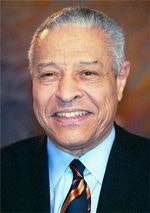 Dr. Clifton R. Wharton Jr.
Dr. Clifton R. Wharton Jr.In advance of the publication of his autobiography on Oct. 1, Dr. Clifton R. Wharton Jr. shared details of his extraordinary life with longtime friend and colleague Bill Moyers in a frank conversation.
It has been a life of firsts for Dr. Clifton R. Wharton Jr. He was the first Black student accepted to the School of Advanced International Studies at Johns Hopkins, first Black person to earn a doctorate in economics from the University of Chicago, first Black president to lead a major predominantly White university and first Black person to serve as Chancellor of the State University of New York system.
Wharton has chronicled his life in the book Privilege and Prejudice: The Life of a Black Pioneer. The 597-page book details his work in higher education, philanthropy, foreign economic development and business. There is also a 1,700-page version developed for academic study.
On Monday evening, Wharton sat down with renowned journalist Bill Moyers before an invited audience at the Wharton Auditorium at TIAA-CREF, the world’s largest pension fund, of which he served as chairman and CEO from 1987 to 1993.
Moyers posed many questions about race and how Wharton experienced prejudice in his life, dealt with it and overcame it. Much of this is detailed in the autobiography. They also discussed Wharton’s remarkable career, which, in addition to serving as the president of Michigan State University, included serving as chairman of the Rockefeller Foundation and being appointed Deputy Secretary of State under President Bill Clinton.
Wharton acknowledged that there has been a real pattern of service in his life in terms of the development of human capital. Whether it was farmers, students, leaders or a broader picture of higher education, Wharton said he sought to explore and develop human capital.
As president of Michigan State University, he introduced the president’s fellows program that each year was made up of one undergraduate student, one graduate student and one assistant professor who would work with him for the year. Four participants went on to become university presidents.
At TIAA-CREF (Teachers Insurance and Annuity Association – College Retirement Equities Fund), he was tasked with protecting retirement funds for people in higher education. By ensuring their future retirement funds, he helped keep talent engaged in higher education, which in turn led to the development of more talent.
While Wharton never allowed anything to dissuade his path, he is frank that he has experienced racism many times. His father was in the Foreign Service, so he did not go to school with other students his age until fourth grade. It wasn’t long until he heard racial pejoratives. As a Tuskegee Airman toward the end of World War II, he was exposed to blatant racism in situations over which he had no control—including a White sergeant insisting he was lying about being a Harvard student. He learned then that to lose your temper was self-defeating.
Moyers asked how Wharton dealt with the realization that our society had structured racism. Wharton replied that his autobiography contains many examples of how he developed his abilities, prepared for opportunities and dealt intelligently with racist behavior.
Wharton said access to a good education is imperative for the development of human capital and lack of access causes great losses.
Changing ingrained racism isn’t easy. He has no definitive answer how to correct it, but he did offer a perspective. He noted that we tend to look at finding the answer as being singular, rather than recognizing there are multiple negative variables at work. It is crucial to understand how these variables relate to each other.
There is still a tremendous residual problem. Finding the answer takes collective effort and everyone has a role to play.















